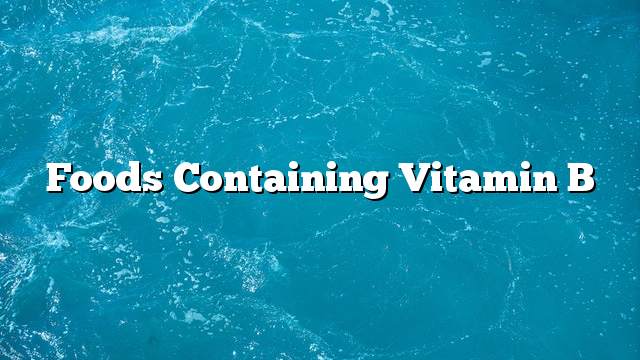Vitamin B
Vitamin B or vitamin B compounds or the integrated group is one of the vitamins dissolved in water that is not retained by the body, it has many functions, the most important: to maintain the health of the nervous system and immune, as well as energy production. Vitamin B can be obtained from various foods or supplements.
In this article we will show the benefits of vitamin B, and the foods that contain it.
Benefits of Vitamin B
- Strengthens the immune system in the body and improves the functions of the nervous system.
- Increases metabolic rate known as metabolism.
- It protects against anemia and increases the growth and division of red cells.
- Maintains healthy skin and muscles.
- Reduces the effects of hyperactivity, increases concentration and attention.
- Reduces the risk of pancreatic cancer.
Vitamin B compounds and their foods
Since vitamin B is an integrated group, we will show vitamin B-containing foods in groups as follows:
Thiamine
- Regulates appetite, and helps metabolism (metabolism).
- Foods containing it are: red meat, dark green leafy vegetables, grains such as wheat, various baked goods, pea rice, lentils, and nuts such as almonds.
- The body needs 1.1 to 1.2 milligrams of it daily.
Riboflavin
- Good for skin health.
- Foods containing it are: dairy products such as milk, cheese, milk, dark green leafy vegetables such as spinach, chicken, fish, eggs and cereals.
- Men need 1.3 mg of it daily, and women 1.1 milligrams a day.
Niacin
- Enhances nerve function, which is beneficial for cardiovascular health and helps to produce energy.
- Foods containing: chicken, turkey, fish of all kinds such as salmon, canned tuna, cereals, legumes, peanuts, wheat and pasta.
- Men need 16 milligrams a day, and women have 14 milligrams a day.
Folic acid
- Useful for the health of red blood cells, and the health of the nervous system.
- Foods containing: leafy vegetables such as spinach, turnips, fresh fruits, and cereals such as bread and pasta.
- It is recommended to eat 400 micrograms daily.
Vitamin B6
- Supports the growth of red blood cells.
- Foods containing: poultry, seafood, bananas, leafy vegetables such as spinach, and cereals.
- It is recommended to take 1.3 milligrams of it daily.
Vitamin B12
- The production of red blood cells increases, as does the nervous system.
- Foods containing: soybeans, cereals, oysters, lobster, fish and beef.
- It is recommended to eat 2.4 micrograms daily.
Biotin
- Helps the metabolism.
- Foods containing: liver and egg yolk.
Pantothenic acid
- Helps the metabolism.
- Foods containing: yogurt and avocado.
